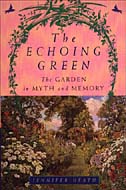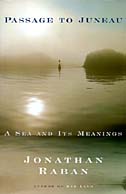|


Comment
on this story
|
|

Two books about traveling to fulfillment—one by water, one by land
by by Jeanne McDonald
For centuries, the human spirit has been uplifted by the beauty of gardens—through rituals, festivals, and personal connections with the earth. Imagine what measure of regret Adam and Eve must have felt when they were expelled from the Garden of Eden, how they must have looked back over their shoulders, aching for all the beauty that was ultimately denied them. Now, in her book, The Echoing Green: The Garden in Myth and Memory (Plume, $13.95), Jennifer Heath has written a volume of memories, information, and classic garden treatises to celebrate "our search for a renewal of the sacred in Nature, a yearning for wonder, the fanciful and fantastic beyond our mortality..."
Heath divides her book into months by chapter, using epigrams and poetry to illustrate the temperament of each particular season. With April's selection from The Canterbury Tales, she flung me back in memory to a chilly classroom at the College of William and Mary, where, in the Chaucer class taught by the formidable Professor Jess Hamilton Jackson, we timorous students were frequently required to read aloud passages in Old English. One that I was called upon to recite, and consequently have never forgotten, was Heath's poetic selection for April: "Whan that Aprille with his shoures soote/The droghte of Marche hath perced to the roote,/And bathed every veyne in swich licour.... ,"
Although T. S. Eliot describes April as the cruelest month, Heath calls it the "sighing month...the air is green mist, a fine, soft shimmy of green in the budding trees, which touch the sky so it's green, too." Interspersed with accounts of her personal gardening experiences, Heath inserts history, recipes, and folklore: "Squeeze a bit of the juice of the foxglove on a sick child's tongue and in its ear, then place the plant on a shovel at the door, swing the shovel three times while shouting, 'If you are a fairy, away with you!' If the child lives, it will soon recover. If it dies, don't be dismayed. It was a fairy, after all, a changeling the Folk switched for your own infant."
Heath's book is a fascinating read, and if you're too busy gardening now, save it for the long dark afternoons of winter, when opening its pages will reassure you that spring, truly, will come again.
Even more enlightening is Jonathan Raban's Passage to Juneau (Pantheon, $26.50), the rambling true-life story of a complicated ocean voyage. The author's one-man trip through the Inside Passage from Puget Sound to Juneau, Alaska, sweeps him into metaphorical whirlpools, cross-currents, and rip-tides that seem far more dangerous than the actual, sometimes turbulent journey he embarks upon to explore the mysteries of the inland waterway. What begins as an intellectual pursuit becomes a highly personal thousand-mile passage into grief and loss.
For Raban, the greatest appeal of his 35-foot sailing vessel is its dozen yards of teak bookshelves. To fill them, he takes along an impressive book collection, foremost among which is George Vancouver's four-volume account of his surveying expedition through the Inland Passage from 1791 to 1795, which Raban uses as a frame for his own journey. His other books "...reflected a promiscuous addition...jumping from the physics of turbulence to the cultural anthropology of the Northwest Indians, to voyages and memoirs, to the literature of the sea from Homer to Conrad..."
But—surprise. Raban confesses that he is afraid of the sea: "I fear the brushfire crackle of the breaking wave as it topples into foam; the inward suck of the tidal whirlpool, the loom of a big ocean swell, sinister and dark, in windless calm; the rip, the eddy, the race; the sheer abyssal depth of the water...Yet for the last fifteen years, every spare day has been spent afloat, in a state of undiminished fascination with the sea, its movements and meanings."
Halfway to Juneau, Raban is called to England, where his father is dying, and, when he resumes his sailing trip, his wife asks for a separation. After a brief emotional reaction, Raban follows the intellectual course and takes solace in the words of Marcus Aurelius: "If [faced with] a chaos undirected, give thanks that amid such stormy seas you have within you a mind at the helm. If the waters overwhelm you, let them overwhelm flesh, breath, and all else, but they will never make shipwreck of the mind."
Although the book begins rather ponderously, just when you begin to think you shouldn't have signed on for the trip, you begin to be compelled by Raban's brilliant accounts of folklore, iconography, oceanography, mythology, art, physics, poetry, and history. Let's hope that whatever stormy seas Raban faces in his personal life, he will indeed keep his mind at the helm and lead us on other literary journeys as rich as this one.

April 20, 2000 * Vol. 10, No. 16
© 2000 Metro Pulse
|